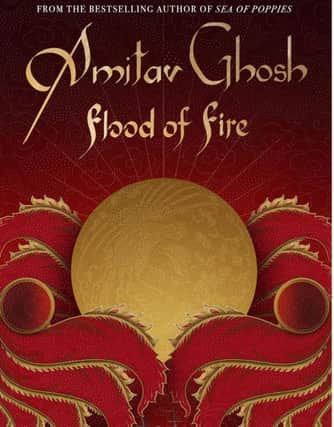Book review: Flood of Fire


FLOOD OF FIRE
Amitav Ghosh
John Murray, 624pp, £20
It is a novel packed with incident, but also one which looks forward to the modern world of global finance. So, for instance, when the book’s most intriguing character, Zachary Reid, a mixed-race American freedman who can pass for white, visits the Opium Exchange in Calcutta. He is surprised to find no goods on display, until it is “explained that this was not a bazaar for opium as such; rather it was a place in which people traded in something unseen and unknown; the prices that opium would fetch in the future, near or distant. In this bazaar there were only two commodities, and both were pieces of paper.” Buyers who thought the price of opium would rise at the next auction would buy one of these “letters”; those who thought it would go down, would buy the other kind. There was, his guide tells him, “more wealth here than in any market in Asia”.
Zachary will eventually go into partnership with an English merchant who combines ruthless profit-taking with the expression of pious sentiments about liberating the backward Chinese; a foretaste of imperialist globalisation.
Advertisement
Hide AdThere is also a strange scene in which a Hindu pundit tells the ambitious sepoy soldier Kesri Singh – perhaps the most engaging character in the novel – that the world is entering a new phase from which a very different one will emerge. The British mission is directed against both the Chinese and Hindustan, united in their greed. It is the duty of “little people” to help the English destroy them in order that a better future may be prepared. This is very odd, especially if one reflects that the eventual disintegration of the British Empire now appears to have ushered in an age of Chinese and Indian ascendancy.
It is unlikely, however, that many readers will care greatly for Amitav Ghosh’s geopolitical speculations or message. On the contrary they will read this rich and engrossing novel first as a splendid adventure story, full of rich and varied characters and romantic entanglements. They will delight too in the colour-scenery, the landscape of Bengal or the picture of Hong Kong island in the early days of European settlement when it was an exception, the one piece of Chinese territory “where foreigners could wander more or less freely , without fear of annoyance or molestation”.
The story of Kesri Singh, loyal servant of the Raj, reminds us that the British Empire in India rested on the support and acquiescence of millions of native Indians. Kesri, serving in the Bengal Native Infantry’s 25th Regiment of the East India Company, knows that his “intelligence, vigour and breadth of experience” have made him a man to be respected. The Army had made him what he is, and he is proud and satisfied to be its servant. He is a figure Kipling would have recognised and approved.
One of the novel’s other remarkable characters – also a Kiplingesque figure perhaps – is Shireen Modi, the widow of a Parsi opium trader. Experiencing “the peculiar kind of loneliness that comes of living in a house where the servants far outnumber their employers” – a nice observation – she will, as a robust and independently-minded woman, break “purdah” to travel to China in an attempt to claim compensation for her late husband’s losses.
For throughout the narrative with its complication, sub-plots and lively narrative, Ghosh never allows us to forget the nature of the opium trade, and to keep us aware of it resonance in the world today. It is a young Scotsman, Peter Fraser, medical student turned skipper of an opium-carrying vessel, who spells it out. “To blame the British for the opium trade,” he says, “was completely misguided. The demand came from Chinese buyers and if the British did not meet it, then others would. It was futile to try to hinder the flow of a substance for which here was so great a hunger. Individuals and nations could no more control this commodity than they could hold back the ocean’s tides… Its flow was governed by abstract laws like those that Mr Newton had applied to the movements of the planets. These laws ensured that supply would match demand as surely as water always seeks its own level.” So it was “even sinful” of the Chinese government “to cite the public good in opposing the free flow of opium. The truth was, in Mr Fraser’s Enlightened Edinburgh opinion, “that the best – indeed the only – way that the public good could be arrived at was to allow all men to pursue their own interests as dictated by their judgement. This was why God had endowed men with the faculty of reason…”
Quite so: that was how enlightened Scots thought then. Things are rather different today. Are they – are we – better?
Advertisement
Hide AdIn the last chapters Amitav Ghosh pulls the strings of his enthralling trilogy together. It’s a remarkable achievement: an adventure novel full of feeling, but one which also invites – even compels – you to think about the assumptions which men act upon.